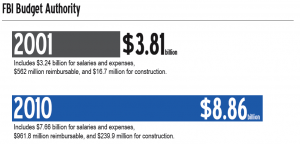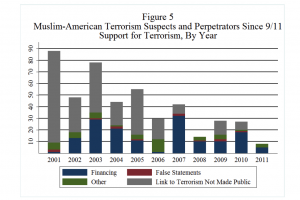91% Fewer Terrorist Sympathizers with Twice the Cash and 48% More Surveillance
 A number of people have pointed to this report showing that the terrorist threat is grossly overblown. Not only does it show that Robert Mueller was overselling the risk of Muslim-American radicalization in the early days of of the War on Terror, and he and Janet Napolitano and Peter King and others continue to do so.
A number of people have pointed to this report showing that the terrorist threat is grossly overblown. Not only does it show that Robert Mueller was overselling the risk of Muslim-American radicalization in the early days of of the War on Terror, and he and Janet Napolitano and Peter King and others continue to do so.
Twenty Muslim-Americans were indicted for violent terrorist plots in 2011, down from 26 the year before, bringing the total since 9/11 to 193, or just under 20 per year (see Figure 1). This number is not negligible — small numbers of Muslim-Americans continue to radicalize each year and plot violence. However, the rate of radicalization is far less than many feared in the aftermath of 9/11. In early 2003, for example, Robert Mueller, director of the Federal Bureau of Investigation, told Congress that “FBI investigations have revealed militant Islamics [sic] in the US. We strongly suspect that several hundred of these extremists are linked to al-Qaeda.”1 Fortunately, we have not seen violence on this scale.
[snip]
These and similar warnings have braced Americans for a possible upsurge in Muslim-American terrorism, which has not occurred. Instead, terrorist plots have decreased in each of the past two years, since the spike of cases in 2009.
Threats remain: violent plots have not dwindled to zero, and revolutionary Islamist organizations overseas continue to call for Muslim-Americans to engage in violence. However, the number of Muslim-Americans who have responded to these calls continues to be tiny, when compared with the population of more than 2 million Muslims in the United States5 and when compared with the total level of violence in the United States, which was on track to register 14,000 murders in 2011.6
But, as Kevin Drum emphasized, the number of Muslim-Americans indicted for supporting terrorism–rather than engaging in a plot–has declined steadily over the last decade.
But while discussing how overblown the threat from Muslim-Americans in this country is, we ought to look at another report, too–perhaps this one, bragging about how much the FBI has changed in the last decade. Because along with visualizing how much more the FBI is spending–more than twice as much–it also notes the FBI has increased surveillance 48% over the decade (and that’s separate from the surveillance the NSA and Homeland Security and local law enforcement have put into place).
In other words, it’s not just that Muslim-American support for terrorism has declined. But it has declined even while we’re spending far more resources looking for it, and we’re just not finding it, much.



Constraining the picture loses important parts.
What about the white supremacists? As a recall [please correct if wrong] Mueller’s report glossed over these groups to hammer the threat from brown people. So, what’s new with the Hutaree, as a recent example?
Speaking of the surveillance DHS has put into place:
Next Thursday
Counterterrorism and Intelligence Subcommittee Hearing: DHS Monitoring of Social Networking and Media: Enhancing Intelligence Gathering and Ensuring Privacy
Maybe we can get them all recursive, where they are monitoring tweets about them monitoring tweet about them monitoring tweets….
This can’t good news for those that check under their bed every night for bad guys. I guess they’ll be busy finding more dopes to set up so the number rise, got to keep the funding going.
If the FBI’s surveillance alone is up 48%, then when added with the domestic surveillance by the Heimatsicherheitsdienst, the NSA and other alphabet soup agencies, total US domestic surveillance has probably more than doubled. Much of the taxpayer cost for that has flown into the hands of private companies, engorging their profits (and political muscle) as well as their inadequately restrained use of the mountains of data being collected, sifted, analyzed, catalogued, patterned and saved for “national security” and private commercial purposes.
@earlofhuntingdon:
Is that what it’s called? I really should have finished learning German cause it describes our current reality so much better.
@rugger9: Oh, but the FBI has a different label for them. They came up recently in the news, but I can’t quite remember what they were called. IIRC, they were mainly White Supremacists or Survivalists (or both).
Bob in AZ
@emptywheel: Nice to exchange notes. You have me on the Czech, but we might spar over how to ask the taxi driver for the Great Wall Hotel while we search for the once non-existent seat belts.
I do think the names of government security services and their methods of interrogation sound better in the original German, although the “-dienst” connotes “service” as well as “agency”. The amount of public service we get, versus bureaucrat fumbling, illegal surveillance and union busting is debatable.
“Alphabet soup agencies”, on the other hand, sounds warm and domestic, if bureaucratic, but it infantilizes powerful, costly and sometimes brutal institutions.
As for “Homeland Security”, it is obviously derived from the German, despite the fantasy that it is Churchillian, like the “Home Guard”, which was a less harmful but perhaps equally effective way to make do with less.
Anther objection to the phrase in English is that it ties together two disparate ideas: the foreign autocratic notion of a “homeland” or “fatherland”, and the idea that security of the kind envisioned by Dick Cheney is possible and preferable. I think not.
“homeland”
Anyone over a certain age, and with some sensitivity, finds it jarring in it’s invocation of all that nasty past German stuff.
The younger ones? Well they just get indoctrinated into the new totalitarianism.
@earlofhuntingdon:
Heimatssicherheitsamt, vielleicht?
I really would love to know how many of those 20 per year were actually do-nothing whiners until the FBI provided a CI/motivational speaker, idea man and monetary support to entrap them…